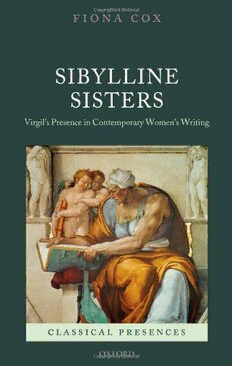
Sibylline Sisters: Virgil's Presence in Contemporary Women's Writing (Classical Presences) PDF
297 Pages·2011·0.945 MB·English
Most books are stored in the elastic cloud where traffic is expensive. For this reason, we have a limit on daily download.
Preview Sibylline Sisters: Virgil's Presence in Contemporary Women's Writing (Classical Presences)
Description:
The history of Virgil and his receptions is long and varied. His twentieth-century career transformed his appearance as an anaemic imitator of Homer into the 'Father of the West', speaking above all for the marginalized and exiled. At the turn of the millennium it is women writers who, having been largely absent from the story of Virgil's reception, are for the first time shaping a new aetas Vergiliana by drawing on his poems to speak of their own preoccupations and concerns. Through an analysis of Virgil's presence in the work of contemporary women writers from North America (Joyce Carol Oates, Janet Lembke, Ursula Le Guin), Britain (Margaret Drabble, A. S. Byatt, Ruth Fainlight, Michele Roberts, Carol Ann Duffy, U. A. Fanthorpe, Josephine Balmer), Ireland (Eavan Boland), and continental Europe (Christa Wolf, Helene Cixous, Charlotte Delbo and Monique Wittig), this book identifies a new Virgil: one who speaks in female tones of the anxieties, exclusions, pleasures, and threats of the contemporary world. While each of the female writers included in this volume draws upon her own distinct cultural heritage, Cox focuses on a number of shared themes and values which emerge through their work.Through the works of these modern versions of the Sibyl, Virgil speaks both of explicitly female concerns and wider cultural issues and threats that shadow modern life.
See more
The list of books you might like
Most books are stored in the elastic cloud where traffic is expensive. For this reason, we have a limit on daily download.
